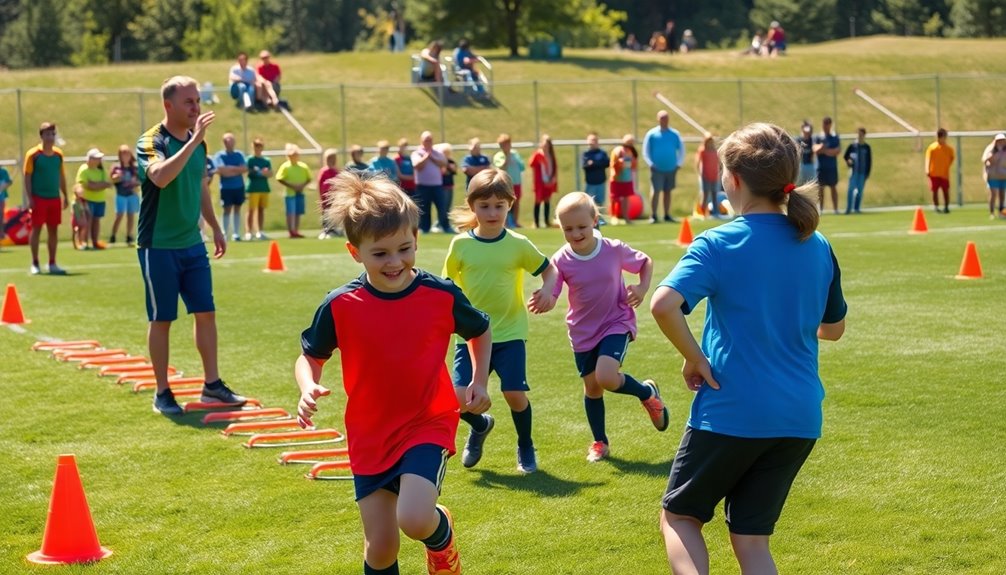
Soccer Drills U12: Building the Future Stars of the Game
February 10, 2025To build the future stars of soccer, focus on engaging drills for U12 players that emphasize technical skills and tactical awareness. Mix small-sided games and skill development activities, like cone dribbling and passing drills, to foster teamwork and decision-making. Incorporate cardio exercises to boost fitness levels while keeping sessions fun and dynamic. Careful coaching supports social-emotional growth, helping players develop confidence and a lasting love for the game. By combining enjoyable activities with structured feedback, you can nurture young talents. Stick around, and you'll uncover even more strategies to elevate your coaching game.
Importance of U12 Soccer Development
U12 soccer is a fundamental time for young players, as it marks the end of the Foundation Phase where they hone their technical skills and individual ball mastery. During this essential period, U12 soccer players focus on technical development, preparing them for larger game formats. Coaches emphasize play-based learning, fostering a love for the game that boosts motivation and encourages participation in future soccer activities. Incorporating cardio training into their routines can also enhance their overall endurance and fitness levels. Additionally, understanding tactical strategies is critical for young players to anticipate opponents and improve their positioning on the field.
Creating an inclusive environment is important at this stage; it guarantees every player feels involved and comfortable on their soccer journey. By doing so, coaches help nurture a passion for soccer, which is critical for long-term engagement in the sport. Positive early experiences during U12 training can greatly influence a player's commitment and enjoyment of soccer as they grow.
Moreover, holistic player development addresses not just the physical aspects but also psychological and social maturation. This all-encompassing approach equips youth athletes with the skills needed to face the challenges of competitive play. Incorporating regular training routines helps young players develop essential skills and fitness levels necessary for future success in soccer.
Key Skills for Future Stars
As players progress through the Foundation Phase, mastering key skills becomes essential for their development into future stars. Dribbling, passing, and shooting are foundational techniques that you need to focus on to foster individual ball mastery.
These skills not only enhance your performance but also prepare you for the challenges of more advanced play. Understanding the Laws of the Game will also help in recognizing the importance of rules and player conduct during practice and matches.
Tactical awareness is equally important. Engaging in small-sided games helps you make quick decisions and understand your positioning and movement off the ball.
Additionally, teamwork and communication during drills are critical, as collaborating effectively will set the stage for success in larger game formats.
Building spatial awareness is significant too. Practice drills that require you to maintain possession and exploit defensive gaps, as this prepares you for complex game strategies.
Finally, don't underestimate the power of creativity. Encouraging individual expression during play boosts your confidence and equips you to make intelligent decisions on the field.
Engaging Training Activities
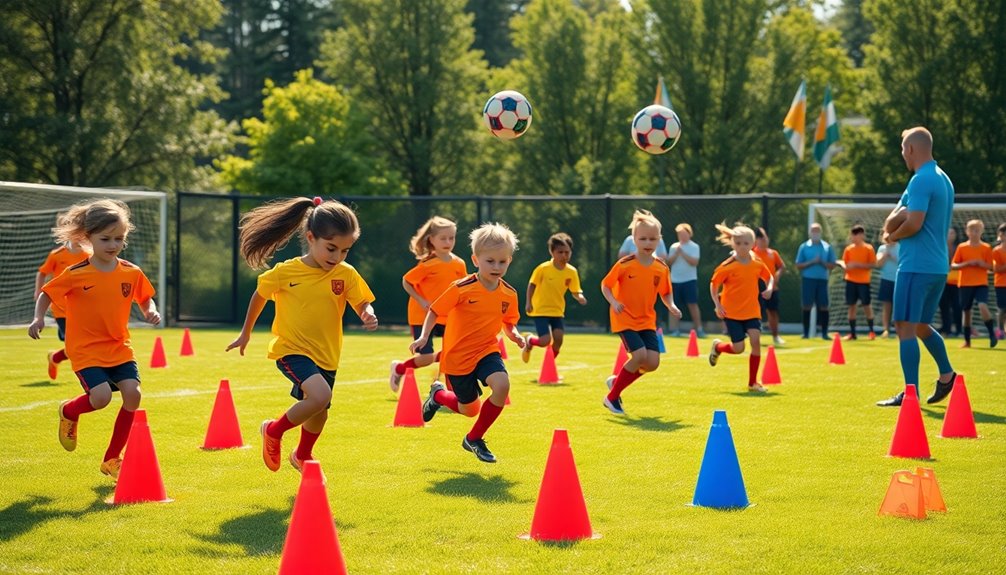
Engaging training activities are essential for keeping young players motivated and excited about soccer. By prioritizing fun, you create an environment where kids develop a lifelong love for the game. Incorporating small-sided games, like 4v4 formats, enhances teamwork and quick decision-making while allowing players to experience more touches on the ball. This competitive yet enjoyable atmosphere boosts their confidence.
Start your sessions with dynamic warm-ups, such as dynamic stretching and fun obstacle courses, to physically prepare players for training. Endurance training methods are also important to help young athletes build stamina for longer play sessions. Skill development drills should challenge them, but keep them enjoyable and accessible for varying skill levels. Drills like cone dribbling and passing accuracy can be both fun and educational. Additionally, a dynamic warm-up routine is crucial for injury prevention and performance enhancement.
Utilizing game-based drills in chaotic scenarios encourages creativity and problem-solving. These engaging training activities help players develop their technical skills while fostering tactical awareness. Additionally, incorporating speed and agility drills into practice can significantly improve their overall performance on the field.
Dynamic Coaching Strategies
Dynamic coaching strategies transform training sessions into vibrant, interactive experiences that challenge young players. By incorporating chaos into your drills, you encourage players to develop essential decision-making skills and problem-solving abilities in realistic game scenarios. Implementing defensive stance drills for beginners can reinforce body positioning and agility essential for effective defense. Additionally, agility drills can enhance footwork speed and change of direction, improving overall performance on the field.
Game-based drills simulate actual match conditions, promoting player engagement while enhancing technical skills under pressure, a vital aspect of U12 development. Additionally, integrating small-sided games into your training can significantly boost defensive skills and enhance strategic acumen.
Effective coaching hinges on clear communication and positive reinforcement. Create a supportive environment where players feel empowered to take ownership of their learning and progress. This not only boosts their confidence but also fosters a love for the game.
Implementing varied drills that focus on fundamental movement skills—like coordination and agility—supports long-term athletic development and prepares players for competitive play.
Don't forget to assess player performance through observation and data collection. Tracking successful passes and goal-scoring opportunities allows you to tailor training to individual needs and measure progress effectively.
Tactical Awareness in Young Players
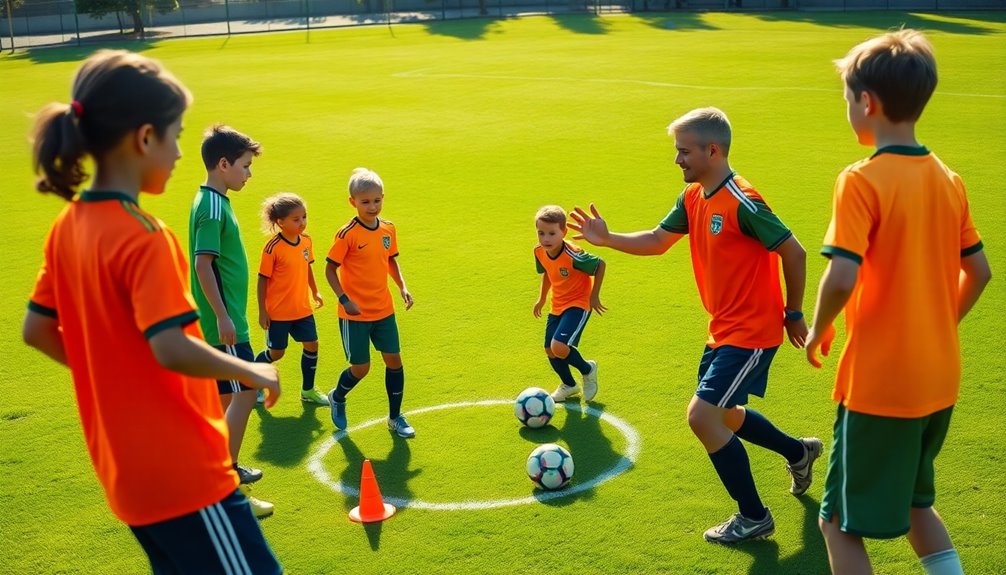
Tactical awareness is essential for young players, as it enhances their understanding of both offensive and defensive formations. This understanding is vital for effective gameplay and decision-making on the field.
By focusing on key aspects, you can help your players develop their tactical skills.
- Positioning: Teach them the importance of being in the right place at the right time. Understanding goalkeeper responsibilities can also help players recognize the importance of positioning for all positions.
- Small-sided games: Utilize these to promote quick thinking and strategic play in a controlled environment.
- Passing angles: Encourage players to create and recognize angles for effective passing.
- Exploiting space: Help them learn how to identify and use open spaces to their advantage.
- Communication: Foster an environment where players talk to each other, enhancing team coordination. Understanding wing-back roles can also help players appreciate their contributions to both defense and attack.
Incorporating drills that emphasize switching play and exploiting defensive gaps will further improve their ability to recognize opportunities and make split-second decisions during matches. Additionally, understanding defensive stance will empower young players to effectively challenge opponents and maintain strong positioning on the field.
Drills for Individual Ball Mastery
To become a better player, you need to focus on essential ball control skills. Fun dribbling exercises not only improve your agility but also help you feel more comfortable with the ball at your feet. Incorporating effective footwork drills into your practice will significantly enhance your dribbling speed and precision. Regular practice of passing accuracy will further elevate your overall game performance.
Let's explore some effective drills that will boost your confidence and technical abilities.
Essential Ball Control Skills
Mastering essential ball control skills is vital for U12 players, as it forms the backbone of their technical development in soccer. Individual ball mastery lays the foundation for key abilities like dribbling, passing, and shooting.
To enhance your skills, focus on specific drills that boost your confidence and effectiveness on the field.
- Cone dribbling exercises: Improve your agility and ball control by weaving through cones, simulating tight spaces in games.
- Shooting techniques: Practice shooting from various distances to develop accuracy and confidence, ensuring you can capitalize on scoring opportunities.
- Small-sided games: Engage in these games to reinforce possession skills, as they require quick decision-making under pressure.
- Warm-up activities: Start with possession-focused drills to build your confidence and encourage risk-taking.
- Ball control drills: Work on juggling and trapping the ball to enhance your touch and comfort with the ball.
Fun Dribbling Exercises
A variety of fun dribbling exercises can transform your practice sessions into enjoyable and engaging experiences while boosting your individual ball mastery. Incorporating cone dribbling drills enhances agility and ball control, allowing young players to develop their skills in a playful environment.
For instance, dribbling through cones with changes of direction teaches you to maneuver effectively under pressure, increasing your spatial awareness on the field.
Working in pairs or small groups fosters teamwork while simulating real-game scenarios. These drills encourage you to practice your dribbling techniques against defenders, making your training both challenging and relevant.
Engaging activities like "Keep Away" promote quick decision-making and improve ball retention, helping you gain confidence in your dribbling abilities during competitive play.
Additionally, obstacle courses that require dribbling, shooting, and passing keep training sessions fun and motivating.
By mixing up these fun dribbling exercises, you not only develop individual skills but also create an environment where learning feels effortless.
Small-Sided Games Benefits
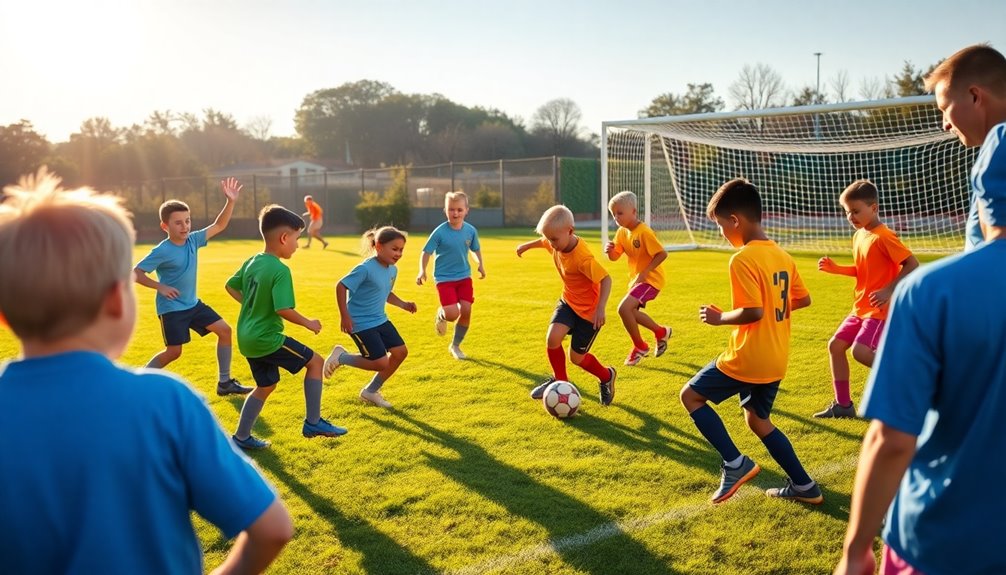
Small-sided games offer numerous benefits for U12 players, making them an essential part of training.
These formats not only increase player engagement but also enhance technical skills through more frequent touches on the ball. You'll find that decision-making under pressure improves as players navigate smaller spaces.
Here are some key benefits of incorporating small-sided games into your training:
- Increased Player Engagement: More touches lead to heightened interest and motivation.
- Enhanced Technical Skills: Players develop better passing, dribbling, and shooting abilities.
- More Goal-Scoring Opportunities: Research shows a 30% increase in scoring chances, helping players learn to exploit space effectively.
- Improved Positional Awareness: Players adapt to various roles, gaining a better understanding of positioning.
- Versatile Training Tool: You can focus on specific skills, such as defensive tactics or passing accuracy.
Focus on Teamwork and Communication
How can effective teamwork elevate your U12 soccer experience?
It's essential for fostering communication skills among players, enabling them to coordinate movements and strategies on the field. By incorporating small-sided games into your training sessions, you'll enhance your team's ability to communicate, as players must constantly interact to maintain possession and create scoring opportunities.
Focus on drills that emphasize overlapping runs and passing patterns. These exercises encourage players to verbalize their intentions, reinforcing the importance of on-field dialogue.
Regularly rotating positions during these drills allows players to understand different roles within the team, promoting empathy and improved communication among teammates.
Research shows that teams with strong communication skills tend to achieve higher success rates in matches. This highlights the critical role that teamwork plays in player development at the U12 soccer level.
By emphasizing teamwork and communication, you're not just building better players; you're creating a cohesive unit that can adapt and thrive on the field.
Holistic Player Development Approach
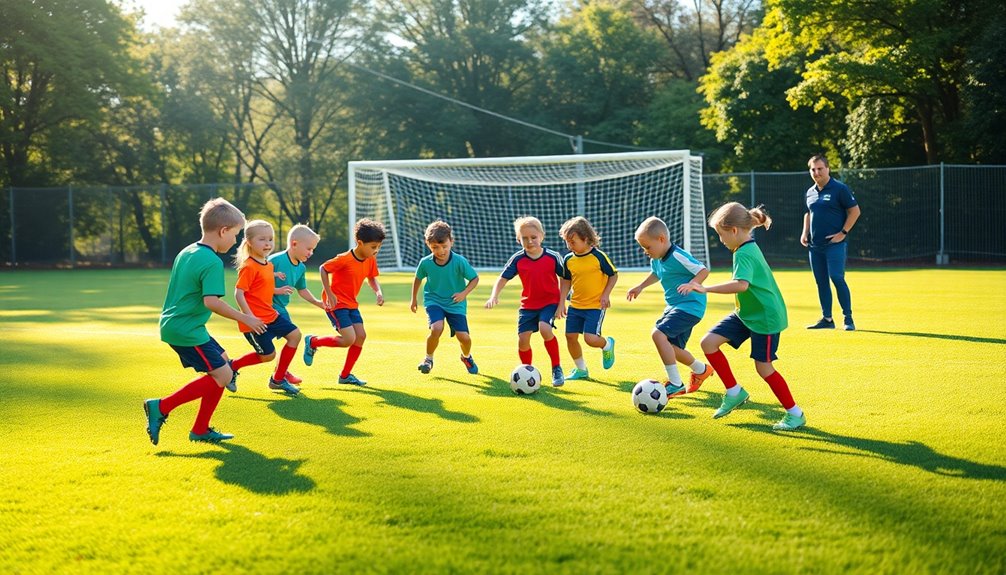
When you focus on a holistic player development approach, you're not just building individual skills; you're also fostering social and emotional growth.
Encouraging decision-making during drills helps players feel more confident on the field and take charge of their game.
This well-rounded strategy guarantees that young athletes develop both their technical abilities and teamwork skills.
Individual Skill Growth
Individual skill growth in U12 soccer players is essential for laying the foundation of their future success on the field. By focusing on core soccer skills like dribbling, passing, and shooting, you not only enhance their technical abilities but also promote a holistic player development approach.
This means considering their psychological and social growth, ensuring they can make independent decisions during games.
To foster individual skill growth, consider these effective strategies:
- Incorporate small-sided games to maximize ball time and engagement.
- Create an inclusive environment where every player feels valued and motivated.
- Encourage self-reflection by prompting players to assess their performance and areas for improvement.
- Focus on decision-making drills that challenge players to think critically on the field.
- Use varied drills to enhance coordination, balance, and agility in a fun way.
Social and Emotional Development
In the journey of developing U12 soccer players, social and emotional growth plays a fundamental role alongside technical skills.
Focusing on social skills is essential, as it helps you foster teamwork and communication during drills. Your players will learn to collaborate and build relationships with their peers, which is important for their overall development.
Using positive reinforcement and constructive feedback can greatly enhance your players' self-esteem and confidence. This approach contributes to their emotional resilience, especially in competitive settings where pressure can be high.
When players feel supported, they're more likely to take risks and grow.
Creating a fun training environment is critical for long-term engagement. When players enjoy their sessions, they're more likely to continue participating in soccer.
Incorporating reflective practices allows them to assess their own emotions and interactions, promoting personal responsibility and self-awareness.
Decision-Making Enhancement
Building on the social and emotional skills developed in practice, enhancing decision-making in U12 players is essential for their growth as holistic athletes. You can achieve this by incorporating small-sided games that challenge players to think quickly and strategically. These games promote real-time decision-making, vital for developing effective decision-making skills.
To further enhance their capabilities, consider these strategies:
- Integrate realistic game scenarios into drills to improve spatial awareness.
- Encourage players to self-assess their decisions during practice sessions.
- Utilize a holistic player development approach that nurtures physical, psychological, and social growth.
- Provide regular feedback and positive reinforcement after drills to boost confidence.
- Create a supportive environment that fosters independence in decision-making.
Incorporating Fun in Practices
How can you keep U12 players engaged and excited during soccer practices? Incorporating fun into your sessions is key. When you emphasize play-based learning, like small-sided games and obstacle courses, you not only enhance engagement but also develop crucial skills like dribbling and passing.
Dynamic and varied drills introduce chaos and competition, promoting decision-making and problem-solving abilities in a supportive environment. Consider fun activities such as the "Keep Away" game or the "Four Corners Game." These drills encourage teamwork and communication, which are essential for social interaction and cooperative play among your players.
Balancing skill development with playful activities guarantees that practices remain enjoyable. When players have positive experiences, they're more likely to stay motivated and committed to soccer in the long run.
By focusing on fun, you're not just teaching soccer; you're building a love for the game. Keep your sessions lively and engaging, and watch your U12 players thrive both on and off the field.
Injury Prevention and Fitness
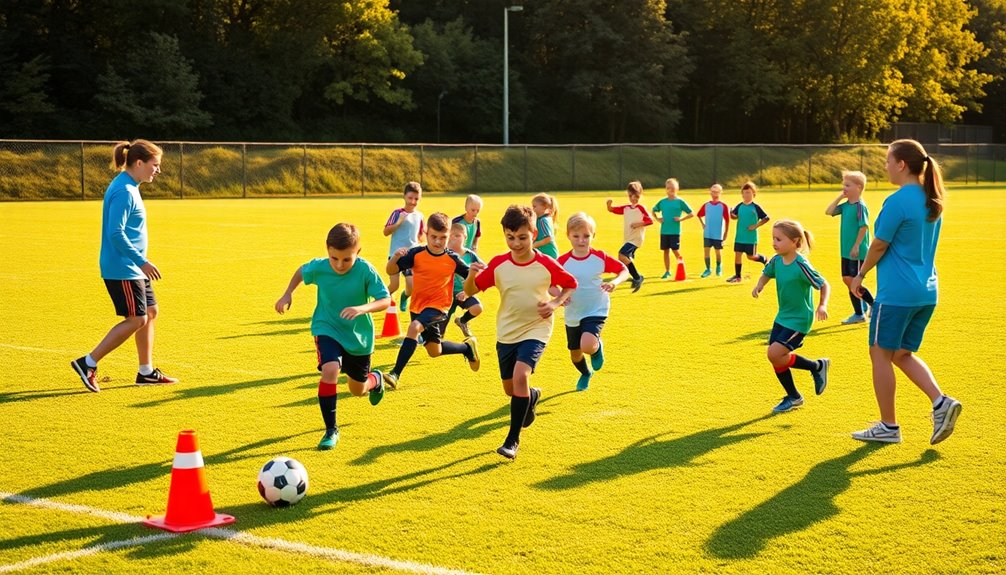
When you prioritize warm-ups, you set the stage for safer practices and games.
Being aware of injury risks helps you make smarter choices on the field, protecting both yourself and your teammates.
Don't underestimate the power of recovery techniques; they're essential for keeping you fit and ready for the next challenge.
Warm-Up Importance
Although many players might see warm-ups as a tedious routine, they play an essential role in injury prevention and overall fitness. Engaging in proper warm-up exercises prepares your body, increasing blood flow to your muscles and improving flexibility. This is vital for reducing the risk of common injuries like sprains and strains.
Incorporating dynamic warm-up routines, such as high knees and lunges, can greatly enhance players' speed, agility, and balance. A well-structured routine should last at least 10-15 minutes to effectively elevate heart rates and prepare you mentally and physically for practice or games.
Consider these key benefits of a solid warm-up:
- Boosts players' speed and agility
- Reduces injury risk
- Improves overall flexibility
- Enhances muscle recovery post-activity
- Prepares you for peak performance
Research shows that teams with consistent warm-up practices report a 30% reduction in injury rates during the season. By prioritizing your warm-up, you not only protect yourself from injuries but also set the stage for your best performance on the field.
Injury Risk Awareness
Injury risk awareness is fundamental for young soccer players, as it helps prevent common injuries like sprains and strains. To enhance player safety and performance, you should prioritize proper warm-up routines before each practice and game. A thorough warm-up prepares your muscles, improving muscle elasticity and reducing the risk of injuries during play.
Incorporating flexibility training into your routine is also essential. It boosts joint mobility and helps prevent youth soccer injuries, allowing for smoother and safer movements on the field. Additionally, tailored strength and conditioning exercises support your athletic development and play a key role in injury prevention.
Don't forget about hydration strategies! Staying properly hydrated is critical to maintaining your energy levels and preventing heat-related illnesses. During practices and games, make sure you drink enough fluids to keep your body functioning at its best.
Finally, being aware of common injuries in youth soccer can empower you and your coaches to implement effective techniques for safe play. By focusing on these aspects, you can notably reduce your risk of injury and enjoy your time on the field.
Recovery Techniques
Understanding injury risk awareness naturally leads to the importance of recovery techniques in soccer.
To keep your young athletes safe and performing at their best, focus on these vital components of injury prevention and fitness:
- Warm-up and cool-down routines: These are essential for preparing the body for activity and aiding in recovery afterward.
- Strength and conditioning: Incorporate exercises to enhance muscular endurance and resilience, addressing the physical demands of soccer.
- Flexibility: Emphasizing stretching and mobility exercises can markedly reduce the risk of common injuries like sprains and strains.
- Nutrition: A balanced diet rich in essential nutrients is vital for young athletes' growth and performance.
- Hydration strategies: Regular hydration during practices and games helps maintain energy levels and prevents dehydration, which can lead to fatigue and increased injury risk.
Role of Coaches in Development
How can coaches shape the development of U12 players in meaningful ways? By fostering a positive environment, you can instill a lifelong love for soccer. Your coaching should emphasize enjoyment and engagement, ensuring players feel included and motivated.
Focus on skill development through age-appropriate activities that challenge and nurture their abilities. Effective communication is essential. Build rapport with your players, using clear and positive messaging during training sessions. This enhances their understanding and keeps them engaged.
Remember, your role extends beyond technical skills; you should also address the physical, psychological, and social maturation of each player. Embracing holistic player development not only boosts their confidence but also prepares them for future challenges on and off the field.
Utilize structured practice plans and drills to maximize your effectiveness. Ongoing support and resources help you adapt to the varying needs of your players, ensuring that each session is productive.
Community Feedback and Support
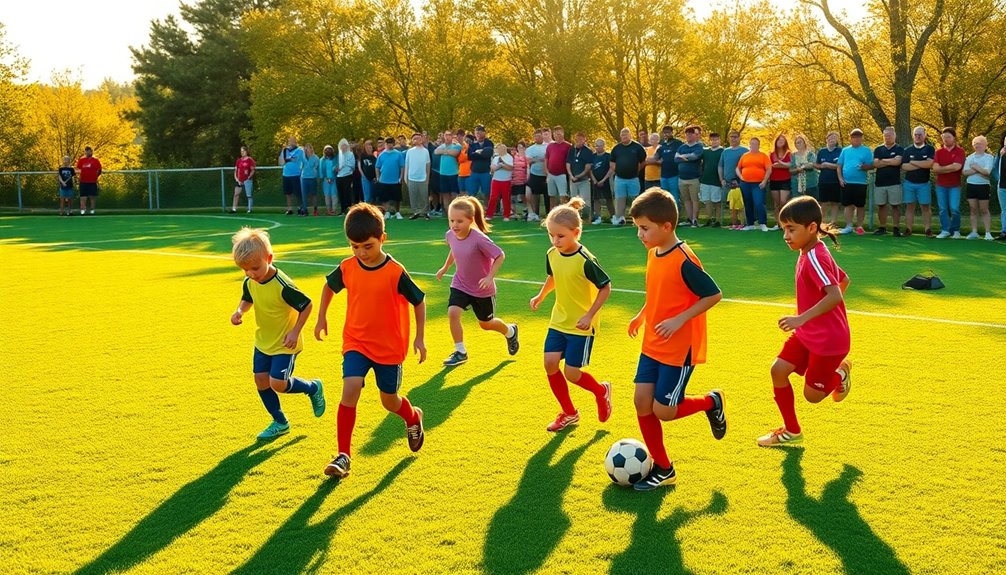
Community feedback plays an essential role in enhancing the coaching experience for U12 soccer players. Your insights and experiences can directly shape youth soccer training initiatives, ensuring they meet the needs of both coaches and players.
Positive testimonials from coaches highlight how resources like Soccer Coach Weekly make a significant impact on coaching strategies and player development.
Here are some key points regarding community feedback and support:
- Inspiration: 93% of coaches feel inspired by the resources provided for youth soccer training.
- Clarity: Testimonials emphasize the practical application of materials, aiding in effective coaching strategies for U12 players.
- Versatility: Resources cater to diverse talent levels, making training sessions engaging for young athletes.
- Confidence: 89% of subscribers report increased confidence in their coaching abilities due to grassroots coaching support.
- Inclusivity: Emphasizing best practices, the focus on creating enjoyable environments fosters player development.
Resources for Coaches
Empowering U12 coaches with the right resources is essential for fostering player development and creating engaging training sessions. One excellent resource you can use is Soccer Coach Weekly, which offers structured coaching plans specifically designed for U12 coaches.
With over 200 soccer drills tailored to various skill levels, you can easily craft effective training sessions that keep your young athletes motivated and challenged.
Access to expert advice and innovative session ideas is another key benefit. Many coaches report increased confidence and effectiveness in their coaching after utilizing these resources.
Plus, as a subscriber, you'll receive weekly emails filled with ongoing support and access to accredited continuing professional development (CPD) opportunities to enhance your skills.
These resources emphasize a holistic approach to player development, addressing the physical, psychological, and social maturation of young athletes.
By integrating these elements into your coaching plans, you'll not only improve their skills on the field but also foster a lasting love for the game.
Utilizing these tools can help you nurture the future stars of soccer while making your training sessions more enjoyable and impactful.
Transitioning to Competitive Play
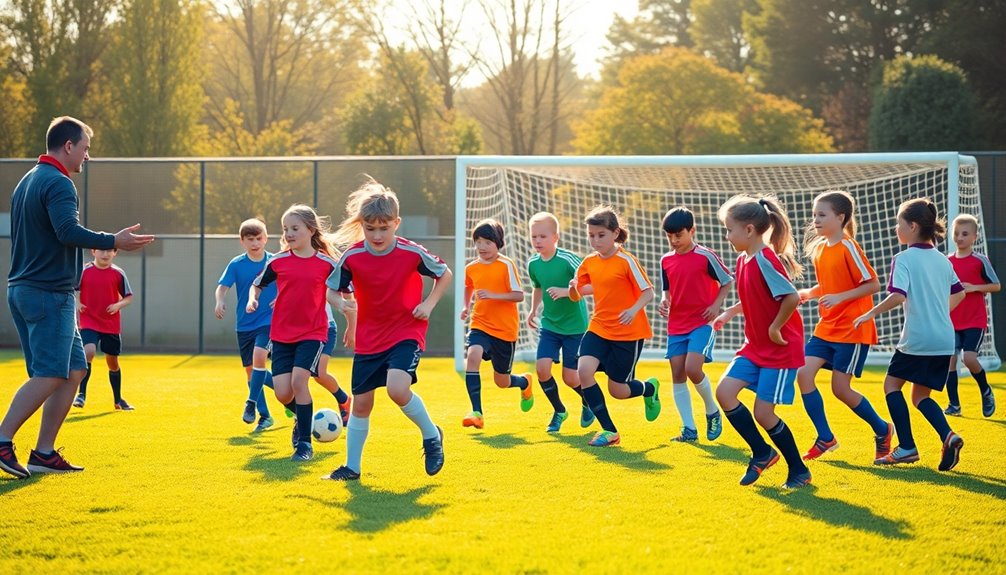
Moving to competitive play is an essential step for U12 players, as it introduces them to structured game formats that highlight teamwork, tactical awareness, and individual skill development.
During this shift, you'll want to focus on creating an inclusive environment that fosters a love for the game. This approach keeps players motivated and engaged.
Incorporating small-sided games is a great strategy. They allow players to have more touches on the ball, enhancing decision-making skills while minimizing the pressure of full-sided matches.
As you guide players through this phase, emphasize the fundamentals of positional play and the significance of off-the-ball movement.
Consider the following key elements during this shift:
- Foster teamwork through collaborative drills.
- Encourage skill development with focused practice sessions.
- Utilize small-sided games for increased ball control.
- Teach positional play to understand roles on the field.
- Promote player reflections for personal growth.
With regular feedback and player reflections, young athletes can take ownership of their development, helping them set personal goals as they adapt to competitive soccer's challenges.
This will prepare them well for future success on the field.
Conclusion
As you guide these U12 players, remember that their future stardom hinges not just on drills, but also on your ability to embrace the chaos of youth soccer. Ironically, the more you endeavor for perfection in their training, the more you'll discover that it's the mistakes and laughter that truly shape their love for the game. So, celebrate the missteps, cherish the moments, and watch as they transform into the stars you always hoped they'd become.


